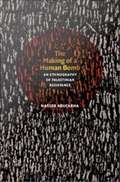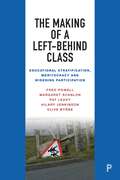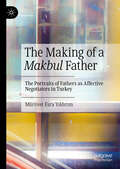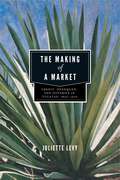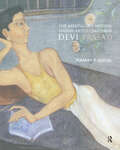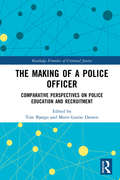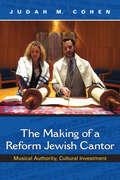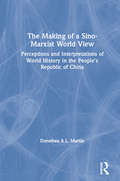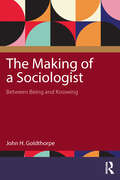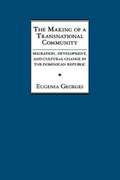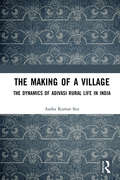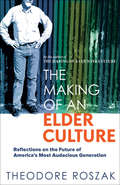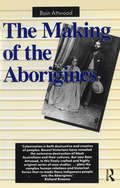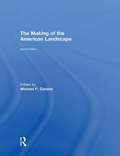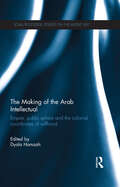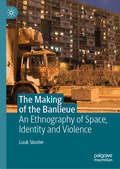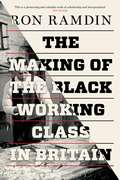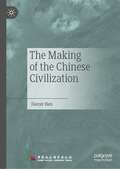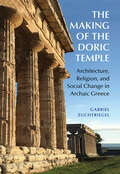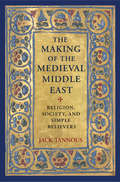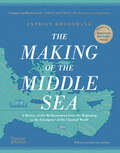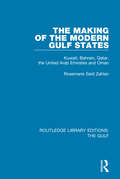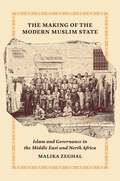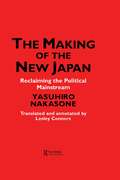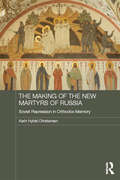- Table View
- List View
The Making of a Human Bomb: An Ethnography of Palestinian Resistance
by Nasser AbufarhaIn The Making of a Human Bomb, Nasser Abufarha, a Palestinian anthropologist, explains the cultural logic underlying Palestinian martyrdom operations (suicide attacks) launched against Israel during the Al-Aqsa Intifada (2000-06). In so doing, he sheds much-needed light on how Palestinians have experienced and perceived the broader conflict. During the Intifada, many of the martyrdom operations against Israeli targets were initiated in the West Bank town of Jenin and surrounding villages. Abufarha was born and raised in Jenin. His personal connections to the area enabled him to conduct ethnographic research there during the Intifada, while he was a student at a U. S. university. Abufarha draws on the life histories of martyrs, interviews he conducted with their families and members of the groups that sponsored their operations, and examinations of Palestinian literature, art, performance, news stories, and political commentaries. He also assesses data--about the bombers, targets, and fatalities caused--from more than two hundred martyrdom operations carried out by Palestinian groups between 2001 and 2004. Some involved the use of explosive belts or the detonation of cars; others entailed armed attacks against Israeli targets (military and civilian) undertaken with the intent of fighting until death. In addition, he scrutinized suicide attacks executed by Hamas and Islamic Jihad between 1994 and 2000. In his analysis of Palestinian political violence, Abufarha takes into account Palestinians' understanding of the history of the conflict with Israel, the effects of containment on Palestinians' everyday lives, the disillusionment created by the Oslo peace process, and reactions to specific forms of Israeli state violence. The Making of a Human Bomb illuminates the Palestinians' perspective on the conflict with Israel and provides a model for ethnographers seeking to make sense of political violence.
The Making of a Left-Behind Class: Educational Stratification, Meritocracy and Widening Participation
by Fred Powell Pat Leahy Margaret Scanlon Hilary Jenkinson Olive ByrneDespite the high aspirations of young people from disadvantaged communities, they face barriers that are frustrating the realisation of their educational ambitions. This book analyses the ‘left-behind’ phenomenon and shows how education has become the new divide in Western society. It explains how denied educational equality and frustrated opportunity are undermining social cohesion and what we can do about it. It challenges meritocratic thinking and the efficacy of widening participation as a policy for social inclusion. Combining analysis of educational disadvantage at an international level and among Travelling communities with empirical data derived from fieldwork with parents, teachers and students in the European Union (Ireland), this book offers fresh thinking and new hope in relation to young people left behind in the opportunity structure.
The Making of a Makbul Father: The Portraits of Fathers as Affective Negotiators in Turkey
by Mürüvet Esra YıldırımThis book draws upon qualitative interviews with lower-middle class men with adult children. It provides important insight into a region of the world that has not been sufficiently studied in the field of Masculinity Studies and analyzes manhood/fatherhood from a novel perspective. It uses Margaret Wetherell’s (2012) theory of “affective practice” to focus on moments men experience masculinity as “essence” and “free play” as formulated by Todd W. Reeser (2010). Elaborating on affective practices which stabilize and destabilize makbulhood, manhood, and fatherhood, it focuses on a long-excluded generation of men in the literature and illuminates men’s “Iamnotlikethem” and “Iamlikeallmenontheearth” moments. It is relevant to researchers in gender studies, masculinity studies, social psychology, and family sociology.
The Making of a Market: Credit, Henequen, and Notaries in Yucatán, 1850–1900
by Juliette LevyDuring the nineteenth century, Yucatán moved effectively from its colonial past into modernity, transforming from a cattle-ranching and subsistence-farming economy to a booming export-oriented agricultural economy. Yucatán and its economy grew in response to increasing demand from the United States for henequen, the local cordage fiber. This henequen boom has often been seen as another regional and historical example of overdependence on foreign markets and extortionary local elites. In The Making of a Market, Juliette Levy argues instead that local social and economic dynamics are the root of the region’s development. She shows how credit markets contributed to the boom before banks (and bank crises) existed and how people borrowed before the creation of institutions designed specifically to lend. As the intermediaries in this lending process, notaries became unwitting catalysts of Yucatán’s capitalist transformation. By focusing attention on the notaries’ role in structuring the mortgage market rather than on formal institutions such as banks, this study challenges the easy compartmentalization of local and global relationships and of economic and social relationships.
The Making of a Modern Indian Artist-Craftsman: Devi Prasad
by Naman AhujaThe Making of the Modern Indian Artist-Craftsman is intended to be a biographical and critical insight into the work of the potter, painter and photographer Devi Prasad. Apart from the making of his personal history and his times, it leads us to why the act of making (art) itself takes on such a fundamental philosophical significance in his life. This, the author explains, derives directly from his absorption of Gandhi’s philosophy that looked at the act of making or doing as an ethical ideal, and further back to the impact of the Arts and Crafts Movement on the ideology of ‘Swadeshi’ and on the milieu of Santiniketan. This book examines his art along with his role in political activism which, although garnered on Indian soil made him crisscross national borders and assume an important role in the international arena of war resistance. Devi Prasad graduated from Tagore’s Santiniketan in 1944 when he joined the Hindustani Talimi Sangh (which promulgated Nayee Taleem) at Gandhi’s ashram Sevagram as Art ‘Teacher’. His political consciousness saw him participate actively in the Quit India Movement in 1942, in Vinoba Bhave’s Bhoodan and later from 1962 onward as Secretary General (later Chairman) of the War Resisters’ International, the oldest world pacifist organisation based in London. From there he was able to extend his Gandhian values internationally. All of this, while continuing with his life as a prolific artist. Rather than view them as separate worlds or professions, Devi harmonises them within an ethical and conscionable whole. He has written widely on the inextricable link between peace and creativity, on child /basic education, Gandhi and Tagore, on politics and art, in English, Hindi and Bangla. In 2007 he was awarded the Lalit Kala Akademi Ratna and in 2008, the Desikottama by Visva Bharati University, Santiniketan.
The Making of a Police Officer: Comparative Perspectives on Police Education and Recruitment (Routledge Frontiers of Criminal Justice)
by Tore Bjørgo Marie-Louise DamenDoes a more academic type of police education produce new police officers that are reluctant to patrol the streets? What is the impact of gender diversity and political orientation on a police students’ career aspirations and attitudes to policing? These are some of the questions addressed by this longitudinal project, following police students in seven European countries. The unique data material makes it possible to explore a wide range of topics relevant to the future development of policing, police education and police science more generally. Part I presents an overview of the different goals and models of police education in the seven participating countries. Part II describes what type of student is attracted to police education, taking into consideration educational background, political orientation and career aspirations. Part III shows the social impact of police education by examining students’ orientations towards emerging competence areas; students’ career aspirations; and students’ attitudes concerning trust, cynicism and legalism. The overall results show that police students are strikingly similar across different types of police education. Students in academic institutions are at least as interested in street patrolling as students in vocational training institutions. Gender and recruitment policies matters more in relation to career preferences than education models. The national context plays a more important role than the type of police education system. Written in a clear and direct style, this book will appeal to students and scholars in policing, criminology, sociology, social theory and cultural studies and those interested in how police education shapes its graduates.
The Making of a Reform Jewish Cantor: Musical Authority, Cultural Investment (A\helen B. Schwartz Book In Jewish Studies)
by Judah M. Cohen“Of interest not only to cantors and their teachers but also to rabbis, congregations and everyone concerned about the future of the Jewish community.” —Florida Jewish JournalThe Making of a Reform Jewish Cantor provides an unprecedented look into the meaning of attaining musical authority among American Reform Jews at the turn of the twenty-first century. How do aspiring cantors adapt traditional musical forms to the practices of contemporary American congregations? What is the cantor’s role in American Jewish religious life today?Judah M. Cohen follows cantorial students at the School of Sacred Music, Hebrew Union College, over the course of their training, as they prepare to become modern Jewish musical leaders. Opening a window on the practical, social, and cultural aspects of aspiring to musical authority, this book provides unusual insights into issues of musical tradition, identity, gender, community, and high and low musical culture.
The Making of a Sino-Marxist World View: Perceptions and Interpretations of World History in the People's Republic of China
by Dorothea A.L. MartinOutlines the political pressures that have shaped the writing and interpretation of modern world history in post-1949 China, and assesses the impact of these pressures and political themes through three case studies: the 17th-century English revolution, the Paris Commune, and the treatment of the Th
The Making of a Sociologist: Between Being and Knowing
by John H. GoldthorpeThis book offers a journey through the problems and the progress of the discipline of sociology in the UK and Europe throughout the second half of the twentieth century via an exploration of seven social settings from the life of a now eminent sociologist. It conceptualises the complex relation that exists between being and knowing, and between the personal knowledge that comes from lived experience and the essentially impersonal knowledge that any science seeks to pursue. The seven – very contrasting – settings are described in detail, together with reference to some of their leading personalities, such as David Glass, Karl Popper, Norbert Elias, Sebastian Sprott, Richard Hoggart, Noel Annan, E. M. Forster, Gösta Rehn, Chelly Halsey, Fred Hirsch and Jürgen Habermas. In each case, the author shows how his lived experience within these settings formed a substratum of his sociology and how he navigated the line between personal knowledge as a creative resource and personal knowledge as potential bias using methodological discipline. It will ultimately appeal to those with interests in sociology, philosophy of science, sociological histories, and biographical methods.
The Making of a Transnational Community: Migration, Development, and Cultural Change in the Dominican Republic
by Eugenia GeorgesA detailed analysis of the effects of political and economic change on Los Pinos, a rural community in the Dominican Republic.
The Making of a Village: The Dynamics of Adivasi Rural Life in India
by Asoka Kumar SenThe Making of a Village examines the social and cultural life of indigenous peoples in India. It unfolds intimate aspects of Adivasi history such as the birth of a village, its demographic formation, forging of social relations, in and out-migration, and the dialectics of village as a socio-physical space during pre-colonial and colonial periods. Drawing on oral, archival and empirical data from eastern India, it highlights the interconnected themes of inflection of identity; the change of the Adivasis from historic agents to colonial subjects and their arcadia to a servile landscape; and the indigenous notion of state. It also initiates a dialogue between the past and present to bring into sharp relief ideas of village community, indigeneity, migration, governance, colonialism, agency, subjecthood, rural change, environment and ecology. Redefining the study of rural sociology in South Asia, this volume will be of great interest to scholars and researchers of modern Indian history, politics, development studies, sociology, social and cultural anthropology, Adivasi and indigenous studies, and South Asian studies.
The Making of an Elder Culture: Reflections on the Future of America's Most Audacious Generation
by Theodore Roszak"It is a brilliant and highly original thesis. I commend Roszak for writing the book." - Tom Pochari, World Affairs Monthly"...sense of optimisim that comes out in this book, where Roszak champions the possibility of restoring that lost commitment to the ideals of libertion." Tom HartleyThe Summer of Love. Vietnam. Woodstock. These are the milestones of the baby boomer generation Theodore Roszak chronicled in his 1969 breakthrough book The Making of a Counter Culture. Part of an unprecedented longevity revolution, those boomers form the most educated, most socially conscientious, politically savvy older generation the world has ever seen. And they are preparing for Act Two.The Making of an Elder Culture reminds the boomers of the creative role they once played in our society and of the moral and intellectual resources they have to draw upon for radical transformation in their later years. Seeing the experience of aging as a revolution in consciousness, it predicts an "elder insurgency" where boomers return to take up what they left undone in their youth. Freed from competitive individualism, military-industrial bravado, and the careerist rat race, who better to forge a compassionate economy? Who better positioned not only to demand Social Security and Medicare for themselves, but to champion "Entitlements for Everyone"? Fusing the green, the gray, and the just, Eldertown can be an achievable, truly sustainable future.Part demographic study, part history, part critique, and part appeal, Theodore Roszak's take on the imminent transformation of our world is as wise as it is inspired-and utterly appealing.Theodore Roszak is the author of fifteen books, including the 1969 classic The Making of a Counter Culture. He is professor emeritus of history at California State University, and lives in Berkeley, California.
The Making of the Aborigines
by Bain AttwoodBefore 1788, the peoples of this continent did not consider themselves 'Aboriginal'. They only became 'Aborigines' in the wake of the British invasion. In this startling and original study, Bain Attwood reveals how relationships between black Australians and European colonisers determined the hearts and minds of the indigenous peoples, making them anew as Aboriginals.In examining the period after the 'killing times', this young historian provides new perspectives on racial ideology, government policy, and the rule of law. In examining European domination, he unravels the patterns of associations which were woven between European and Aborigine, and shows the complex meanings and significance these relationships held for both groups.In this book, the dispossessed are not cast as merely passive victims; they appear as real characters, men and women who adapted to European colonisation in accordance with their own historical and cultural experience. Out of this exchange the colonised created a new consciousness and began to forge a common identity for themselves.A story of cultural change and continuity both poignant and disturbing in its telling, this important book is sure to provoke controversy about what it means to be Aboriginal.'This intelligent and impeccably researched book seeks to advance our understanding of the story of white/Aboriginal contact. It will be required reading for anyone working in the field.' - Henry Reynolds'Colonisation is both destructive and creative of peoples. Recent historians have revealed the extensive destruction of black Australians and their cultures. But now Bain Attwood, in this finely crafted and highly original series of case studies. plots the complex human relations and historical forces that re-made these indigenous people into the Aborigines.' - Richard Broome
The Making of the American Landscape
by Michael P. ConzenThe only compact yet comprehensive survey of environmental and cultural forces that have shaped the visual character and geographical diversity of the settled American landscape. The book examines the large-scale historical influences that have molded the varied human adaptation of the continent’s physical topography to its needs over more than 500 years. It presents a synoptic view of myriad historical processes working together or in conflict, and illustrates them through their survival in or disappearance from the everyday landscapes of today.
The Making of the Arab Intellectual: Empire, Public Sphere and the Colonial Coordinates of Selfhood (SOAS/Routledge Studies on the Middle East)
by Dyala HamzahIn the wake of the Ottoman Empire’s nineteenth-century reforms, as guilds waned and new professions emerged, the scholarly ‘estate’ underwent social differentiation. Some found employment in the state’s new institutions as translators, teachers and editors, whilst others resisted civil servant status. Gradually, the scholar morphed into the public writer. Despite his fledgling status, he catered for the public interest all the more so since new professionals such as doctors, engineers and lawyers endorsed this latest social role as an integral part of their own self-image. This dual preoccupation with self-definition and all things public is the central concern of this book. Focusing on the period after the tax-farming scholar took the bow and before the alienated intellectual prevailed on the contemporary Arab cultural scene, it situates the making of the Arab intellectual within the dysfunctional space of competing states’ interests known as the ‘Nahda’. Located between Empire and Colony, the emerging Arab public sphere was a space of over- and under-regulation, hindering accountability and upsetting allegiances. The communities that Arab intellectuals imagined, including the Pan-Islamic, Pan-Arab and socialist sat astride many a polity and never became contained by post-colonial states. Examining a range of canonical and less canonical authors, this interdisciplinary approach to The Making of the Modern Arab Intellectual will be of interest to students and scholars of the Middle East, history, political science, comparative literature and philosophy.
The Making of the Banlieue: An Ethnography of Space, Identity and Violence
by Luuk SlooterThis book studies and disaggregates the "crisis of the suburbs" in Paris through the stories of inhabitants in 4000sud: a French suburban neighborhood. These stories have become pressing in the aftermath of the recent wave of terrorist attacks in France. The French banlieues are some of the most prominent and infamous examples of urban neighborhoods affected by vandalism, rioting, criminality and chronic poverty. Based on extensive ethnographic research, the book explores the making of the French suburban crisis as constituted both externally (by state actors) and internally, by young people at the street corner. It reveals how the French state’s understanding of banlieue violence, and subsequent policy measures, contribute to the creation and hardening of boundaries between "us" and "them". The book takes the reader on a journey from the city center of Paris to the heart of neighborhood 4000sud. It unveils how young suburban residents try to cope simultaneously with the negative images imposed on them from the outside, and the disciplinary expectations of their peers on the street. In search for identity and dignity they navigate life through diverging strategies: they escape the neighborhood, contest stereotypical images through (violent) protest, or confirm and act out the image of "gangster from the ghetto". Drawing on Urban Sociology, Human Geography, and Cultural Anthropology, this book offers new analytical vocabularies to understand the connections between place-making processes, social identity dynamics and violent performances. The book is written for a broad audience of students, scholars and policy makers interested in contemporary (sub)urban violence in Europe.
The Making of the Black Working Class in Britain
by Ron RamdinA classic history of the role of Black working-class struggles throughout the twentieth centuryThis is the first comprehensive historical perspective on the relationship between Black workers and the changing patterns of Britain’s labour needs. It places in an historical context the development of a small black presence in sixteenth-century Britain into the disadvantaged black working class of the 1980s.The book deals with the colonial labour institutions (slavery, indentureship and trade unionism) and the ideology underlying them and also considers the previously neglected role of the nineteenth-century Black radicals in British working-class struggles.Finally, the book examines the emergence of a Black radical ideology that has underpinned the twentieth-century struggles against unemployment, racial attacks and workplace grievances, among them employer and trade union racism.From the Trade Paperback edition.
The Making of the Chinese Civilization
by Jianye HanThis book involves collection of papers primarily focused on the origin and development of Chinese civilization in the concept of archaeological context from the 6000 BCE to 1300 BCE through archaeological cultural perspectives. It systematically illustrates the prehistoric cultural history of China at the period from Neolithic to the early Bronze Age during 20000-1300 BCE, composing not only the proper region around the Central Plain but also the margin areas mainly in the west, and examines the cultural relationship and exchanges nationally and internationally through thousand years of advancing social complexity in geographical and temporal genealogies. It introduces three prehistoric stages for the course of Chinese Civilization Development; the three major Civilization Development Models during the Chalcolithic period; how environmental changes and warfare functioned as the part of mechanism to make civilization evolve; the Bronze Age Revolution from the West; and the critical evaluation of the characteristics belonging to Chinese Civilization and the review of ancient legendary histories and legends through the archaeological perspectives. This book is essential reading for all those wanting more information about the foundations of Chinese history and civilization through archaeological studies.
The Making of the Doric Temple: Architecture, Religion, and Social Change in Archaic Greece
by Gabriel ZuchtriegelIn this volume, Gabriel Zuchtriegel revisits the idea of Doric architecture as the paradigm of architectural and artistic evolutionism. Bringing together old and new archaeological data, some for the first time, he posits that Doric architecture has little to do with a wood-to-stone evolution. Rather, he argues, it originated in tandem with a disruptive shift in urbanism, land use, and colonization in Archaic Greece. Zuchtriegel presents momentous architectural change as part of a broader transformation that involved religion, politics, economics, and philosophy. As Greek elites colonized, explored, and mapped the Mediterranean, they sought a new home for the gods in the changing landscapes of the sixth-century BC Greek world. Doric architecture provided an answer to this challenge, as becomes evident from parallel developments in architecture, art, land division, urban planning, athletics, warfare, and cosmology. Building on recent developments in geography, gender, and postcolonial studies, this volume offers a radically new interpretation of architecture and society in Archaic Greece.
The Making of the Medieval Middle East: Religion, Society, and Simple Believers
by Jack TannousA bold new religious history of the late antique and medieval Middle East that places ordinary Christians at the center of the storyIn the second half of the first millennium CE, the Christian Middle East fractured irreparably into competing churches and Arabs conquered the region, setting in motion a process that would lead to its eventual conversion to Islam. Jack Tannous argues that key to understanding these dramatic religious transformations are ordinary religious believers, often called “the simple” in late antique and medieval sources. Largely agrarian and illiterate, these Christians outnumbered Muslims well into the era of the Crusades, and yet they have typically been invisible in our understanding of the Middle East’s history.What did it mean for Christian communities to break apart over theological disagreements that most people could not understand? How does our view of the rise of Islam change if we take seriously the fact that Muslims remained a demographic minority for much of the Middle Ages? In addressing these and other questions, Tannous provides a sweeping reinterpretation of the religious history of the medieval Middle East.This provocative book draws on a wealth of Greek, Syriac, and Arabic sources to recast these conquered lands as largely Christian ones whose growing Muslim populations are properly understood as converting away from and in competition with the non-Muslim communities around them.
The Making of the Middle Sea: A History of the Mediterranean from the Beginning to the Emergence of the Classical World
by Cyprian BroodbankAn award-winning history of the Mediterranean from prehistory to the Classical world reissued with an extended new preface by the author. For millennia, the Mediterranean has been one of the global cockpits of human endeavor. World- class interpretations exist of its classical and subsequent history, but there has been remarkably little holistic exploration of how its societies, culture, and economies first came into being, despite the fact that almost all the fundamental developments originated well before 500 BCE. The Making of the Middle Sea offers a full interpretive exploration into the rise of the Mediterranean world from its beginning, before the emergence of our own species, up to the threshold of classical times. Extensively illustrated and ranging across disciplines, subject matter, and chronology, from early humans and the origins of farming and metallurgy to the rise of civilizations—Egyptian, Levantine, Hispanic, Minoan, Mycenaean, Phoenician, Etruscan, early Greek—the book is a masterpiece of archaeological and historical writing. Now featuring a new preface exploring the most recent archaeological research on the Mediterranean world.
The Making of the Modern Gulf States: Kuwait, Bahrain, Qatar, the United Arab Emirates and Oman (Routledge Library Editions: The Gulf #10)
by Rosemarie Said ZahlanThe Gulf States are the focus of great international interest – yet their fabulous evolution from pearl-fishing to oil-drilling, their individuality and variety, are screened by a thick cloud of petro-dollars. This book, first published in 1989, tells the story of their formation, their evolution from colonial dependency to statehood, and their transformation by oil. The result is an informed and balanced picture of the political, economic, religious and cultural character of the area. It is also a story of the powerful families and their sheikhs that have had to hurry these states into the modern world; of the interchanging role of political and economic dependence, the influence of the oil industry, the influx of workers from abroad, and the varying forces acting on the Gulf States.
The Making of the Modern Muslim State: Islam and Governance in the Middle East and North Africa (Princeton Studies in Muslim Politics #90)
by Malika ZeghalAn innovative analysis that traces the continuity of the state&’s custodianship of Islam as the preferred religion in the Middle East and North Africa In The Making of the Modern Muslim State, Malika Zeghal reframes the role of Islam in modern Middle East governance. Challenging other accounts that claim that Middle Eastern states turned secular in modern times, Zeghal shows instead the continuity of the state&’s custodianship of Islam as the preferred religion. Drawing on intellectual, political, and economic history, she traces this custodianship from early forms of constitutional governance in the nineteenth century through post–Arab Spring experiments in democracy. Zeghal argues that the intense debates around the implementation and meaning of state support for Islam led to a political cleavage between conservatives and their opponents that long predated the polarization of the twentieth century that accompanied the emergence of mass politics and Islamist movements.Examining constitutional projects, public spending, school enrollments, and curricula, Zeghal shows that although modern Muslim-majority polities have imported Western techniques of governance, the state has continued to protect and support the religion, community, and institutions of Islam. She finds that even as Middle Eastern states have expanded their nonreligious undertakings, they have dramatically increased their per capita supply of public religious provisions, especially Islamic education—further feeding the political schism between Islamists and their adversaries. Zeghal illuminates the tensions inherent in the partnerships between states and the body of Muslim scholars known as the ulama, whose normative power has endured through a variety of political regimes. Her detailed and groundbreaking analysis, which spans Tunisia, Morocco, Egypt, Turkey, Syria, and Lebanon, makes clear the deep historical roots of current political divisions over Islam in governance.
The Making of the New Japan: Reclaiming the Political Mainstream
by Yasuhiro Nakasone IPS Chiyoda-ku Leslie ConnorsYasuhiro Nakasone's rise to political prominence began under the watchful eye of the American occupation with which he had a direct and confrontational relationship, arguing for the ending of the occupation and the restoration of sovereignty to Japan. Nakasone argued for Japan's need to become a 'normal' nation which in his view involved an enhanced international role for Japan and an enhanced role for the prime minister in domestic policy-making. Both ideas have come to win an increasingly broad acceptance, although Nakasone's slow rise to the position of prime minister bears testament to the controversy aroused by his views. These political memoirs chart the journey from his youth in the aftermath of the First World War to his appearance on the world stage at the side of President Reagan. They conclude with his thoughts, on the eve of the domestic upheavals which saw the fall of the LDP, on the prospects for a third 'opening' of Japan to rival the Meiji Restoration and the MacArthur reforms. Now an adviser to a younger generation of politicians, he is regarded by many as a modern-day Genro for Japan.
The Making of the New Martyrs of Russia: Soviet Repression in Orthodox Memory (Routledge Religion, Society and Government in Eastern Europe and the Former Soviet States)
by Karin Hyldal ChristensenFollowing the end of the Soviet Union, the Russian Orthodox Church has canonized a great number of Russian saints. Whereas in the first millennium of Russian Christianity (988-1988) the Church recognized merely 300 Russian saints, the number had grown to more than 2,000 by 2006. This book explores the remarkable phenomenon of new Russian martyrdom. It outlines the process of canonization, examines how saints are venerated, and relates all this to the ways in which the Russian state and its people have chosen to remember the Soviet Union and commemorate the victims of its purges. The book includes in-depth case studies of particular saints and examines the diverse ways in which they are venerated.
